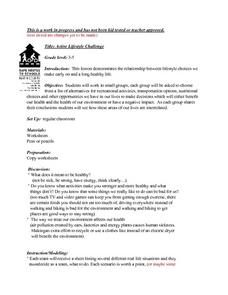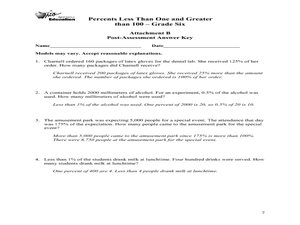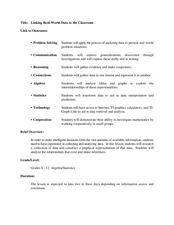Curated OER
Trigonometry Practice: Trigonometric Graphs #2
In this trigonometric functions worksheet, students solve 8 multiple choice and graphing problems. Students graph trigonometric functions given an equation and match graphs to a given scenario.
Curated OER
Opportunity Cost
High schoolers review the concept of opportunity cost. Using a clip from a money, they identify the people who made a choice and the value of the choice given up. They read various scenarios about opportunity costs and trade-offs and...
Curated OER
Acting with Integrity
Middle schoolers discuss the meaning of integrity. In this language arts lesson plan, students work in small groups to read scenarios and discuss how integrity applies to all scenarios. Middle schoolers discuss what the benefits of...
Curated OER
Acting on Integrity
Learners explore philanthropy and integrity. In this philanthropy lesson, students define the word "integrity," and role play various scenarios to demonstrate integrity.
Curated OER
Additions Incorporated
Students fill out a graphic organizer to prewrite about additions they would make to a school building. In this writing lesson plan, students do this as a start to a persuasive paper.
Curated OER
Between a Rock and A Hard Place
Pupils identify what information they would need to make a decision about the breaching of a dam in order to save wild salmon. They evaluate the scenario in depth focusing on the economic impact on the community, and the salmon.
Curated OER
Skills for Building Healthy Relationships
Students create skits showing relationship problems and discuss how communication, cooperation, and compromise can build strong relationships. In this healthy relationships lesson plan, students are given a scenario to act out in...
Curated OER
Economics: The Scarcity Principle
Students discover how scarcity leads to economic choices. They examine its effect on individuals, business, and governments. Students simulate various scenarios to determine the role scarcity plays in each.
Curated OER
Problems with Rivers
Students explore the PNI model. In this river pollution lesson, students use the PNI (positive-negative-interesting) problem solving model to analyze 5 scenarios.
Curated OER
I Was Just Kidding!
Students examine the difference between good-natured teasing and bullying through discussion of fictional scenarios and reflect on real-life situations. They use guidelines to help them realize when harmless joking has crossed the line...
Curated OER
One Survivor Remembers: Twenty Pounds
Young scholars explore a Holocaust survivor's story. In this Holocaust activity, students consider the emotions Jews forced from their homes might have experienced. Young scholars discuss 2 scenarios that involve picking up and leaving...
Curated OER
Active Lifestyle Challenge
Students, in groups, choose from a list of alternatives for recreational activities, transportation options, nutritional choices and other opportunities people have in their lives to make decisions which either benefits or has a negative...
Curated OER
How To Be A True Friend
Student develop the importance of a healthy friendship. In this healthy friendship lesson , 4th graders participate in role-playing and enhance their interpersonal skills as well as their life skills. Students...
Curated OER
PAY CREDIT WHEN CREDIT IS DUE
Students learn about credit cards and scores and how to and not to use them. In this financial concept lesson, students are given hypothetical scenarios where they are able to apply learning's to given situations as they figure rates,...
Curated OER
The Beagle Brigade
Students brainstorm how to handle conflict scenario. In this character education lesson, students read a story and respond as to how the characters should handle the conflict. Students examines feelings of characters and...
Curated OER
Focusing Event
Fifth graders read Swiss Family Robinson and respond to a survival scenario. In this focusing event lesson, 5th graders reflect on what they would do during a situation that required them to make a choice. Students share...
Curated OER
Percents Less Than One and Greater Than 100
Sixth graders express numbers as percents greater than 100 and less than one. For this lesson on percents, 6th graders work in groups with real life scenarios to develop an understanding on percentages greater than 100 and less than one....
Curated OER
Save the Library!
Students discuss library resources and how to locate them by answering various scenarios. Role-playing as librarians, they write essays stating five reasons why the library should not be closed down.
Curated OER
Back to the Age of Exploration
Young scholars explore world history by researching explorers of North America. In this famous explorers lesson, students research one specific explorer of their choice and identify his successes and failures by utilizing the Internet....
Curated OER
POWERS OF THE PRESIDENT: THE CASE OF LATVIA
Pupils compare the powers of a U.S. president to those of leaders of other countries. They pretend they are presidential advisors and make decisions as a group as to what the president has the right do in different situations.
Curated OER
Terrorism: What's in a Word?
Students read selected articles and discuss various definitions of terrorism. They create a chekclist of their definitions. Students listen as the teacher reads several scenarios aloud and decide if the incident would count as terrorism....
Curated OER
Idioms
Students study the meanings of idioms containing the phrase "up" or "down." In this language lesson, students are given an online scenario where the idiom phrases are used. Students answer multiple choice questions about their meaning.
Curated OER
Linking Real World Data to the Classroom
Learners analyze data representing real life scenarios.In this algebra lesson, students collect, plot and analyze data using a graph. They use different methods to represent and present their data.
Curated OER
I Know What You Did this Summer
Students discuss the characteristics of a quality relationship and determine how such a relationship is maintained. After reading a scenario of a relationship, students take one character at a time and place themselves in the character's...

























